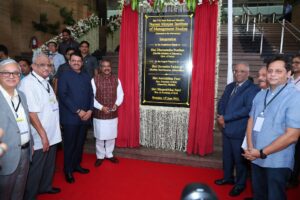
People in India need to integrate, change mindsets and IT systems as well as create an infrastructure that will help in inter-modal connectivity and hence Transportation; Warehousing & Inventory; Administrative and Order Processing are the key focus areas which can help in reducing the logistics cost, say experts.
The draft National Logistics Policy sets targets to try and reduce the overall national logistics cost that looks like a stiff target. But we think it’s possible to do due to a lot of work happening in the infrastructure sector and some process reforms have been taken place in the past few years, said Mr Vikas Chaube, Joint Secretary, Logistics, Union Ministry of Commerce & Industry.
Mr Chaube was speaking at the technical session on “Revolutionize Urban Logistics in the 3rd Edition Virtual Supply Chain Excon: Future of Global Supply Chain and Logistics,” organized by PHD Chamber of Commerce and Industry (PHDCCI).
Mr Chaube opined that city logistics is an area of focus looking at the expansion in e-commerce and growing needs of the rural population. There is a need to maintain smooth systems, institutional mechanisms, right coordinating involving all stakeholders and authorities that will help to smoothen the working of city logistics.
Cities should develop their logistics considering their population, needs, freight, transportation, and other important factors. He mentioned that five stages to better city logistics plan are data; institutional mechanism; creating a guiding mission; make an evaluation framework and find modes of arranging capital, he added.
Talking about the challenges faced by warehousing, Mr Chaube said the ministry was well aware of it. Many of the logistics are in the zone of the Government of India and state list which requires the involvement of a lot of stakeholders. But the importance of this area is being looked after closely by the government and developments are taking place in the area of approvals.
Capt T S Ramanujam, CEO, Logistics Skill Council, said there is a need to get all the regulators and stakeholders together for ensuring seamless working and development of the logistics sector. He also mentioned that there is a need for better IT and communication systems; improvement of the health of the employees; promotion of skill development; ease of doing business; improvement of freight management and creation of transit hubs.
Mr Piush Goyal, Managing Director, Kelley Material Handling, said there is a need for road infrastructure, different trucks based on the goods, and investment in technology for improvement in the logistics sector, especially in warehousing and hardware.
Mr Tepaswi PVN, Head – Logistics, Henkel India, apprised about mindset change in making the logistics sector more functioning, competitive and prosperous. He opined that there was a need for infrastructure and skill development which will lead to employment generation. There is also a need for a smart card for these truck drives to mitigate the rechecking of documents. He emphasized that rural logistics will also help in making smart cities.
Mr Amit Gupta, Vice President, Synchronized Supply Systems said that rural logistics have a lot of business opportunities due to rapid urbanization and increase in demand of retail sector but, there is a need for standard wages labour, fewer reservations, skill development of workers, and better IT connectivity.
Mr Umesh Grover, Secretary-General, CFSAI, while giving an overview about urban logistics, mentioned that there was a need for small trucks, increase coastal shipping, and providing incentives for the same and more standardization.
Mr Vipin Vohra, Co-Chair Logistics Committee, PHDCCI, said that a policy needs to be developed which helps to recognize the logistics sector as an industry as it was playing a major role in the development of the country and at the same time helps in trade regulation.
He suggested that money should be invested in infrastructure that will equip the brokers with modern equipment. He also suggested that there must be a legal policy for place allotment of warehouses and opined that the government should allot some place in different business parks to the warehousing that will help to reduce the transportation cost.



